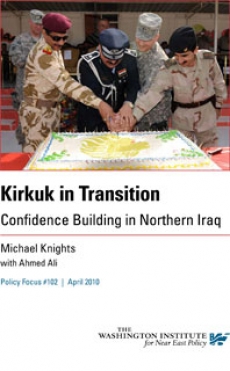
Kirkuk in Transition
Confidence Building in Northern Iraq
The research and production of this Policy Focus would not have been possible without the foresight, wisdom, and commitment of a number of people and institutions. First and most important, I would like to thank The Washington Institute’s trustees for their unstinting commitment to high-quality analysis in support of U.S. policymaking. Both they and the Board of Directors continue to make a real difference by nurturing the ideas and specialized information that policymakers need to make fully informed decisions. I would like to extend special thanks to Chairman Emeritus Fred S. Lafer for his longstanding support of my research on conflicts in Iraq, Yemen, and the wider Persian Gulf.
This kind of study depends greatly on institutional support, which The Washington Institute’s research and administrative staff provided in abundance. Many thanks are due to Executive Director Robert Satloff and Deputy Director for Research Patrick Clawson for encouraging our work on this project. I would also like to thank Michael Eisenstadt, permanent head of the Military and Security Studies Program, for his guidance. Other Institute fellows were generous in their support as well, notably Soner Cagaptay, David Pollock, J. Scott Carpenter, John Hannah, and Nazar Janabi. And special thanks are due to research associate Ahmed Ali, my good friend and colleague, for the invaluable research he contributed on Kirkuk city’s ethnic fabric and planned municipal development. Ahmed is an example to all analysts—thoughtful, honest, and eager to learn.
The Institute’s editorial staff deserves a big thankyou for the effort it put into editing and producing this study. Working under severe time and resource constraints, they efficiently shepherded it to completion and were great fun to work with, as always. Special thanks go out to Alicia Gansz, Mary Kalbach Horan, and George Lopez. Thanks are also due to Alex Tait and Vickie Taylor of International Mapping Associates for their rapid and high-quality work on the detailed maps of Kirkuk.
Finally, I would like to thank the many experts who provided vital information, opinions, and reviews. Although most of them cannot be named due to their roles in the U.S. government, Iraqi military, or Kurdish political community, three individuals merit special mention. Qubad Talabani, the Kurdistan Regional Government representative to the United States, deserves thanks for his gracious support of the project. Brig. Gen. David Paschal, who commanded U.S. forces in Kirkuk during a critical period in 2007–2008, provided crucial support as well. And Ambassador Thomas Krajeski, former U.S. special representative to northern Iraq, offered a valuable insider’s perspective regarding the challenges of developing U.S. policy on an issue like Kirkuk. I would also like to thank the staff of the UN Assistance Mission in Iraq (UNAMI) for their outstanding input.
Michael Knights
April 2010 | 